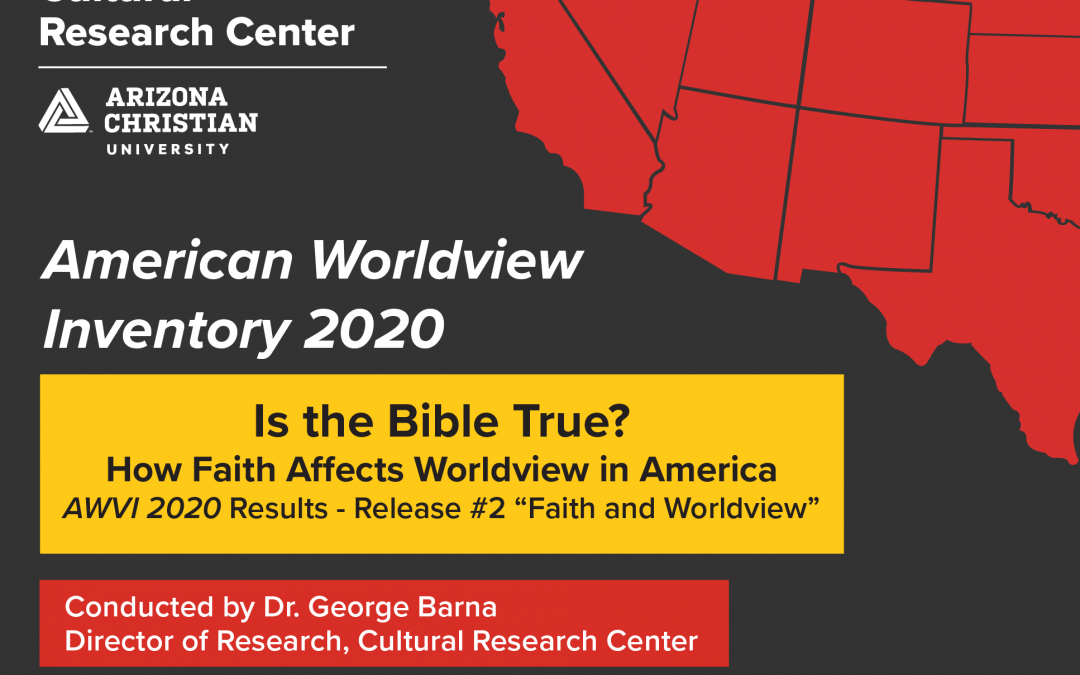By Dr. Tracy Munsil, Executive Director | Cultural Research Center at Arizona Christian University
Growing skepticism about the Bible, especially among young people and even in some of the nation’s largest Christian denominations, is to blame for the precipitous decline of biblical worldview in America.
Stunning new results from the American Worldview Inventory 2020, produced by the Cultural Research Center (CRC) at Arizona Christian University, found that the percentage of Americans who believe that the Bible is the inspired, true word of God is down more than 21 percentage points since 2000. This parallels a similarly precipitous 50% decrease in biblical worldview in America over the same time period, from 12% to the current 6%—the lowest number ever recorded.
“These trends could be devastating—but only if they continue,” said ACU President Len Munsil. “Our priority is to reverse these trends, especially in how we educate the next generation. For example, at Arizona Christian University, every student is immersed in studying the Bible and taught to think and live according to the biblical worldview.”
“We want our graduates to lead lives that fully embrace and reflect the biblical worldview,” he said. “Nothing is more important than preparing our students for lives of influence for the Kingdom in all areas of leadership in America and the world.”
The latest findings show significant shifts in the relationship between peoples’ faith and their worldview, including unexpectedly dramatic changes in how Americans view the Bible. Trust in the Bible can be seen to vary by religious affiliation, with growing skepticism continuing to drive the decline in the biblical worldview in America, according to the AWVI 2020, the first annual nationwide worldview survey conducted by veteran researcher Dr. George Barna, Director of Research for the CRC at ACU.
The AWVI 2020 shows that people’s beliefs about the Bible directly correlate with whether they develop a biblical worldview. Unsurprisingly, those who believe the Bible is the true word of God are much more likely to have a biblical worldview. Conversely, those more skeptical of the Bible—a rapidly increasing number of American adults—are less likely to have a biblical worldview.
As Barna noted about these AWVI 2020 results, “What we’re seeing, the weak linkage between Bible appreciation, church affiliation, and biblical worldview, especially among young people, is concerning for the future of the nation.”
AWVI 2020 key findings:
- Four out of every ten people (41%) believe that the Bible is the word of God and contains no factual or historical errors. One out of every seven of those adults (14%) has a biblical worldview. While that percentage is low, it is more than double the national average. The biblical worldview of those with a skeptical view of the Bible plummets to 2% or less.
- Church affiliation strongly affects a person’s view of the Bible and their worldview. For instance, of the 13% of Americans who attend Evangelical churches, which teach that the Bible is the word of God and is reliable and trustworthy in all matters, 21% hold a biblical worldview, the highest of all faith groups looked at in the study.
- Those belonging to the other two major U.S. Christian faith groups hold a more skeptical view of the Bible and a correspondingly lower percentage possess a biblical worldview. Catholic churches, the largest U.S. denomination, attract one out of every five adults (21%). Only 1% of American Catholics have a biblical worldview. Mainline Protestant churches attract 8% of the adult public and 8% have a biblical worldview.
- As a person’s trust in the Bible declines, so does the likelihood they will develop a biblical worldview. For example, “born-again” Christians constitute one-third of the population (33%) but less than one out of five holds a biblical worldview (19%), a figure that while low, is triple the national average (6%). Unsurprisingly, among “Spiritual Skeptics,” the fastest-growing faith segment in the nation (21%), less than one-half of one percent hold a biblical worldview.
- Teens and individuals in their twenties read the Bible less often than other adults, attend church less often, and are more likely to attend churches that reject the authority of the Bible. Adults under the age of 30 are both the least likely to have a biblical worldview and to engage Christianity through churches that believe the Bible is the true word of God.
The results from this new research emphasize the importance of carefully measuring and intentionally developing the biblical worldview, especially among younger people. CRC, which conducts strategic cultural research through a collaborative effort of the faculty and staff at ACU, is facilitating cultural transformation in America through worldview education. CRC is the only institute conducting this kind of nationwide worldview research and is using those studies as the foundation for creating new resources for worldview training. CRC’s goal is to share its research findings with those who share a vision for Bible-driven cultural transformation.
This latest report, “Is the Bible True? How Faith Affects Worldview in America,” is the second of 12 biweekly releases from the AWVI 2020. The full release of these latest findings is available here here.

